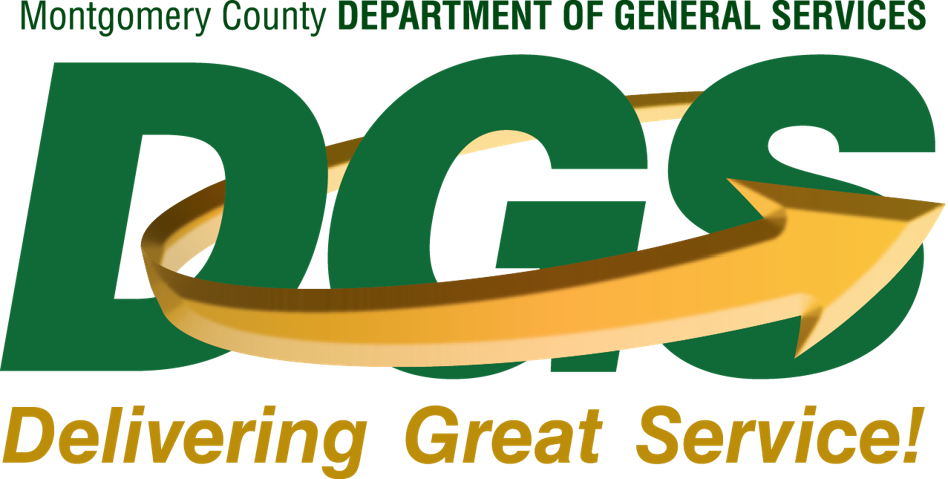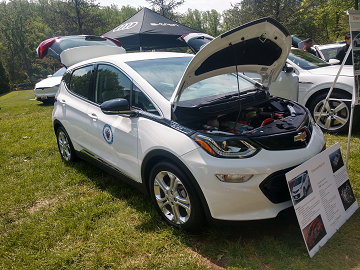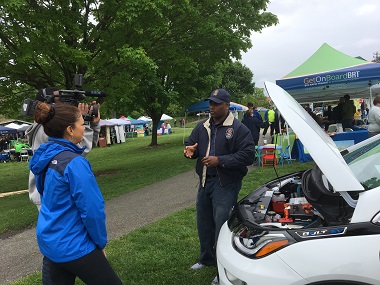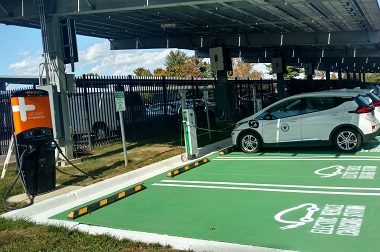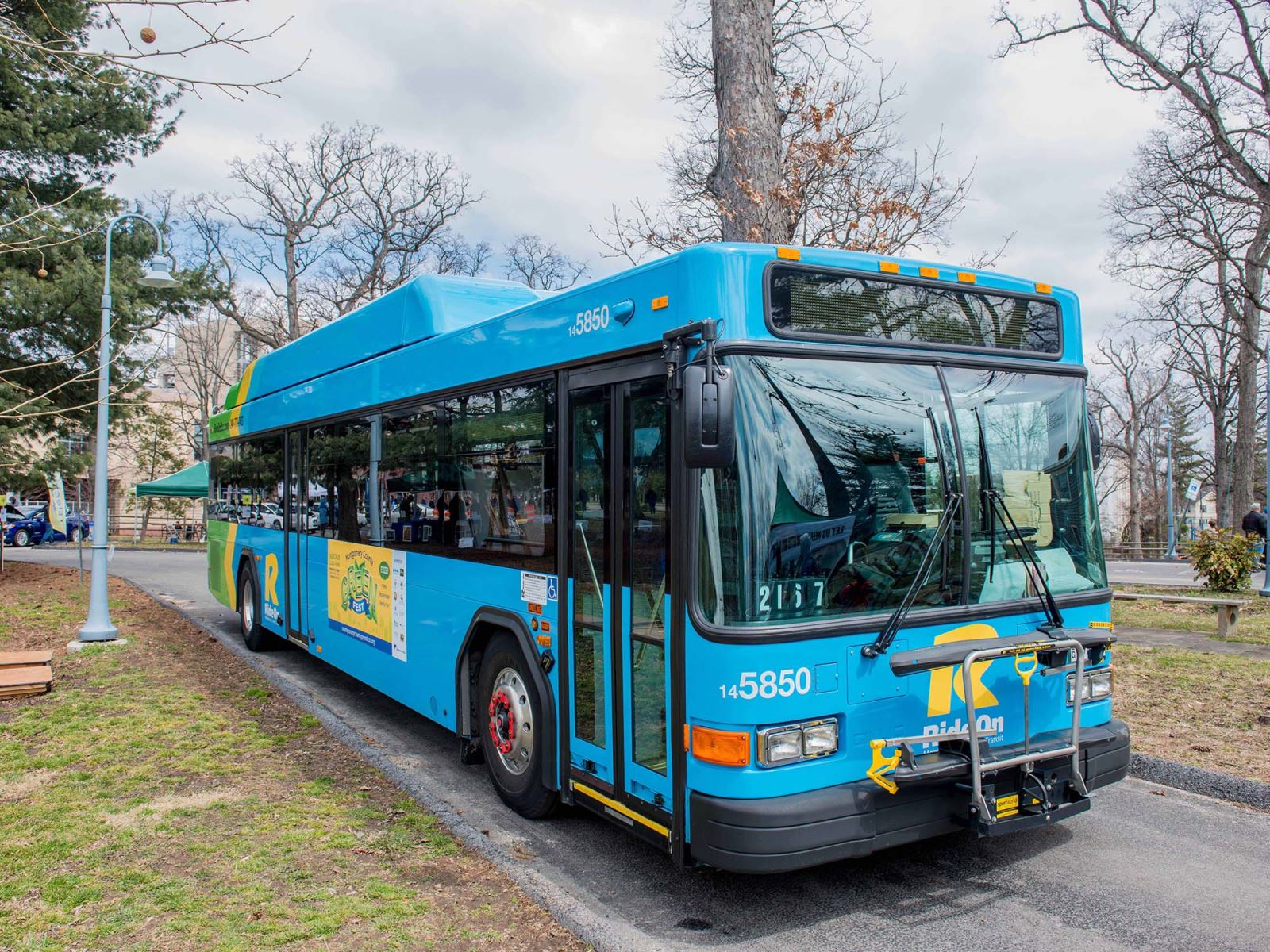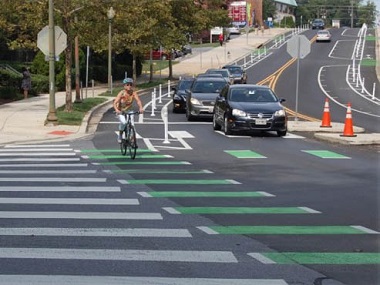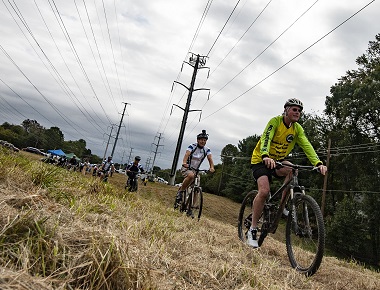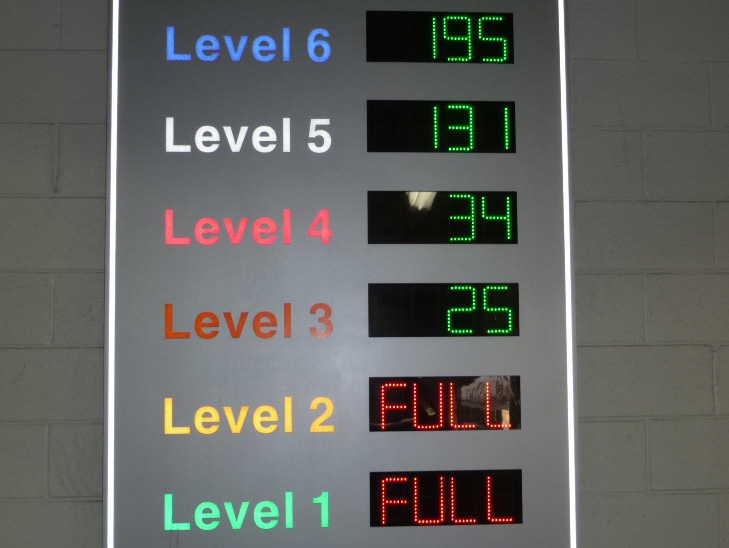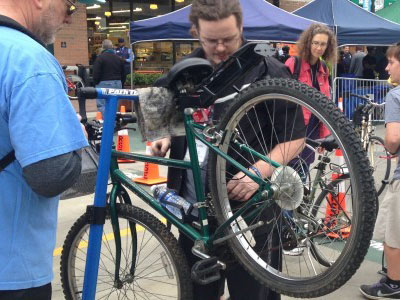Category Name
Transportation
Media heading
- Goal:
- Reduce petroleum fuel consumption by 20% by 2020.
- Progress:
- From 2014 to 2018, reduced petroleum consumption by 3.5%.
About
The transportation sector generates the largest share of greenhouse gas emissions in the United States. The Division of Fleet Management Services has a comprehensive Green Fleet Strategy that combines
- sound management,
- fleet rightsizing and alternative fuels,
- innovative technology, and
- electric vehicles and charging infrastructure
to achieve a 20% reduction in petroleum consumption by 2020. Between FY2014 and FY2018, Green Fleet efforts have reduced petroleum consumption by 190,160 gallons, a 3.5% reduction.
Montgomery County Department of Transportation (DOT) is committed to designing roads, parking garages, and public transit to support a sustainable and resilient County. Additionally, employees are encouraged to commute green by bicycle and public transportation and reduce travel by telework and teleconferencing. Learn more by reading DOT’s Sustainability Policy.
Green Fleet
Fleet Rightsizing
Montgomery County maximizes fuel efficiency ensuring each vehicle is the appropriate size for its intended use. DGS maintains an SUV inventory which includes the type of work currently performed with the vehicles and makes recommendations for the most fuel-efficient replacement for the intended use where appropriate. County Fleet currently consists of 34% fuel alternative vehicles, including electric vehicles, hybrids, E85, and compressed natural gas (CNG) vehicles.
Innovation Technology
Media heading
Technology and driver training improve vehicle performance, reduce miles traveled and minimize idling time. The County analyzes vehicle operating data using telematics – a combination of GPS devices, mapping software, real-time vehicle data, and connected mobile devices to optimize routes in response to road conditions, minimize idling, and empower drivers to see important connections between driving choices and environmental impact. DGS installs idle reduction technology on vehicles with high levels of idling; currently 57 Fleet vehicles have idle technology with plans for installation on an additional 125 vehicles.
Electric Vehicles
Media heading
The County currently has 39 electric vehicles and 193 hybrid vehicles. Fleet operates charging stations at 12 facilities throughout the County with 4 stations open for public use. DOT has also made electric vehicle charging available at County-owned public parking facilities in Bethesda, Silver Spring, and Wheaton; there are a total of 16 charging stations at County public parking facilities each with 2 charging ports. Maps are available to help you locate public EV charging stations. The County is continuously expanding electric vehicle charging infrastructure to support County fleet as well as charging options for the community.
Public Transportation
Media heading
DOT makes bus commuting attractive to the public and County employees. Nearly a third of the County’s more than 300 Ride On buses are fueled by clean CNG. An additional 17.5% of the County’s buses are diesel hybrid electric. In September 2017, the County secured a $1.75 million grant from the Federal Transit Administration to purchase 4 electric buses and charging stations. The all-electric, zero-emission buses will run all day on a single charge. The County is pursuing additional grants for electric buses and charges.
Starting in October 2017, the County began offering Ride On extRa service on Rte. 355, which provides a faster option for bus riders during rush hours. Initial ridership has exceeded the projected figure of 1,600 riders per day. The County is also planning for a Bus Rapid Transit System that will operate along U.S. 29 as a high quality, environmentally- friendly transit alternative to commuters.
Green Commuting
Media heading
The County encourages employees to use public transit, ride-sharing, bike commuting, and telework to reduce vehicle miles traveled and lower greenhouse gas emissions. Commuter benefits to employees include free Ride On bus use, reduced cost of membership for bikesharing, and subsidized public transit and van-pooling for eligible employees.
Montgomery County encourages bike commuting by constructing separated bike lanes including several completed and in progress projects in Bethesda and Silver Spring. In addition, DOT installs bike racks on all Ride On buses. The County has partnered with Capital BikeShare to install more than 83 BikeShare stations near major facilities and urban areas, benefiting both employees and the public. The County is also piloting dockless bikeshare options in Silver Spring, allowings customers to use a mobile phone app to locate a bike rather than relying on fixed stations. Additionally, 80% of Montgomery County parking garages have bike racks with a total of 85 bike racks and capacity to secure 170 bikes.
Telework and Teleconferencing
Media heading
Montgomery County has implemented an official telework policy, in which employees telework one day per week or on an as needed basis. There are more than 300 employees currently participating in the program which keeps cars off the road and reduces GHG emissions. Flexible work schedules also allow employees to work full time while eliminating several commuting days each month.
The County encourages teleconferences and webinars to reduce driving time and fuel use for meetings, along with GHG emissions related to travel. DTS ensures County staff have the tools they need to collaborate and work remotely including Skype for Business and Office 365 software. Additionally, Libraries uses online training modules rather than having staffers travel to the central administrative office and have modified delivery routes to decrease driving time between stops, save fuel and reduce GHG emissions.
Smart Parking
Media heading
Montgomery County is using new technology in some of our most popular public parking garages to guide drivers to available spaces, saving driving time and reducing greenhouse gas emissions. In addition, nearly 2,360 solar powered smart meters for on-street parking have been installed in Bethesda, Silver Spring, and Wheaton. The County is further reducing energy use and greenhouse gas emissions by replacing lighting in public garages and lots with energy efficient LED lights.
To learn more about what you can do visit https://mygreenmontgomery.org/projects/transportation/.

